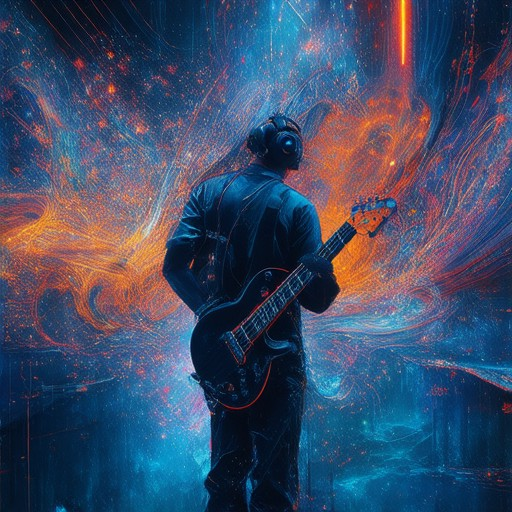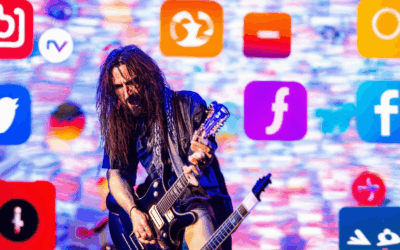Discover the essential tools that are transforming the music industry, empowering musicians to create, collaborate, and connect with audiences like never before. In today’s digital age, musicians have access to a wealth of powerful software and platforms designed to streamline their creative process and amplify their reach. Whether you’re a seasoned composer or an aspiring artist, understanding the right tools can make all the difference. From production software like ProTools and FL Studio to platforms for collaboration and distribution, there’s a digital tool for every aspect of music-making. Explore how these tools are shaping the future of music and discover the best options to elevate your craft.
Key Takeaways
– Understanding the Importance of an Electronic Press Kit: Discover how an Electronic Press Kit (EPK) is a pivotal tool for musicians, enabling effective promotion, career growth, and seamless connection with fans and industry professionals.
– Components of an Effective EPK: Explore the essential elements of a musician’s EPK, including artist bios, audio samples, tour dates, media libraries, discographies, and social media links.
– EPK vs. Traditional Press Kit: Learn how EPKs offer more than just information—they provide multimedia experiences and interactive content, setting them apart from traditional press kits.
– Why EPKs Remain Relevant: Understand why EPKs are still crucial in today’s music industry, thanks to their ability to deliver professional presentations, maintain consistent branding, enhance communication efficiency, and boost artist visibility.

What Software Do Musicians Use to Make Music?
Musicians use various Digital Audio Workstations (DAWs) to create, mix, and produce music. Among the most popular options are:
- Pro Tools : A leading choice for professional studios, known for its extensive features and versatility.
- Ableton Live : Popular for live performances and production, offering a user-friendly interface.
- Logic Pro X : A powerful tool for macOS users, known for its advanced editing and mixing capabilities.
- FL Studio : Widely used in the EDM community for its robust features and flexibility.
- Reason : Created by Propellerhead, it’s known for its intuitive interface and creative tools.
- Cubase : Another top choice by Steinberg, famous for its high-end audio production features.
- Bitwig Studio : A versatile DAW that supports multiple platforms and offers a customizable workflow.
Each DAW has unique strengths, catering to different musical styles and production needs. Whether you’re a seasoned musician or just starting out, experimenting with these tools can help you find the best fit for your creative process. Explore their official websites to learn more and download trial versions.
Technology Used by Musicians
Musicians utilize a diverse array of technologies to create, produce, and perform music. Here’s an overview of the primary tools and technologies commonly employed:
- Digital Audio Workstations (DAWs):
DAWs like Pro Tools , Logic Pro X , and Ableton Live are essential for recording, mixing, and mastering music. They provide the necessary software tools for tracking and producing high-quality audio. - Live Sound Systems:
For live performances, musicians rely on PA systems such as those from Yamaha and Bose . These systems include speakers, amplifiers, and effects to ensure clear and powerful sound reproduction. - Instruments and Amplifiers:
Electric guitars, basses, and amplifiers are staples in music production. Effects pedals and units like the TC Electronic chorus pedal enhance the tonal quality of instruments. - Vocal Technology:
Singers and vocalists use microphones, such as those from Shure , and effects processors to manipulate and enhance their voices. Popular effects include reverb and delay. - Production Software:
Beyond DAWs, musicians use plugins and virtual instruments to simulate classic and rare sounds. Plugins from companies like iZotope are widely used for effects processing and mastering. - Laptops and Tablets:
Portable devices equipped with music production apps and cloud storage solutions like Google Drive allow musicians to work on the go. Tools like GigPerfector aid in show preparation. - Smartphones and Tablets:
Devices like the iPhone and iPad are used extensively for recording, editing, and sharing music. Apps such as ForTune help analyze and enhance audio quality. - Collaboration Tools:
Online platforms like Avid Track and SoundCloud facilitate collaboration and distribution of music projects. Social media platforms are also leveraged for promotion and fan engagement. - Emerging Technologies:
Musicians are exploring gaming and virtual reality (VR) for innovative performance experiences. Platforms like Unity integrate music into game environments, and VR headsets offer immersive ways to present music. - Wearable Devices:
Smartwatches and fitness trackers like Fitbit help musicians monitor physical health and performance metrics during live performances.
By leveraging these technologies, musicians can create, produce, and deliver high-quality music across various platforms and formats, catering to diverse audiences and artistic visions.

Music Platforms Musicians Use
Musicians utilize various platforms to share their work, connect with fans, and promote their music. Here are some primary platforms:
- Streaming Services:
- Spotify
- Apple Music
- Amazon Music
- YouTube Music
- Pandora
- iHeartRadio
- SoundCloud
- Deezer
- Tidal
- Napster
- Music Distribution:
- Bandcamp
- SoundCloud
- Discord
- Social Media Platforms:
- YouTube
- TikTok
- SoundCloud
- Spotify
- Live Streaming:
- SoundCloud
- Mixcloud
- Twitch
- Instagram Live

What is an Electronic Press Kit for Musicians?
An electronic press kit (EPK) for musicians is a comprehensive digital resource designed to help artists showcase their talent, share their work, and connect with fans and industry professionals. Essentially, it serves as an all-in-one platform that combines various tools and information into one accessible place.
Here are the key components typically found in a musician’s EPK:
- Artist Bio: A detailed description of the musician’s background, style, and unique story.
- Audio Samples: High-quality tracks, singles, or album excerpts for listeners to explore.
- Tour Dates: Information on upcoming performances, festivals, and live events.
- Media Library: Photos, videos, and press materials to visually represent the artist’s work.
- Discography: A complete listing of albums, EPs, singles, and other releases.
- Social Media Links: Direct links to the artist’s social media profiles for fan interaction.
- Press Materials: Press releases, artist statements, and high-resolution images for media use.
To create an effective EPK, musicians often utilize platforms that offer customizable templates, ensuring the content aligns with their branding and style. These platforms may also include SEO tools to help the EPK rank higher in search engine results, making it easier for potential fans and industry professionals to discover the artist.
The benefits of using an EPK extend beyond promotion; it can help musicians build a loyal fanbase, attract new followers, and gain attention from promoters, booking agents, and journalists. By centralizing all relevant information, an EPK simplifies the process of sharing and discovering the artist’s work, ultimately aiding in the growth of their career.
When utilizing an EPK, consider sharing it through social media channels, embedding it on your official website, or distributing it to relevant contacts in the music industry. Including a call-to-action, such as encouraging fans to follow you on social media, can further enhance engagement and visibility.
What is the difference between a press kit and an EPK?
A press kit and an electronic press kit (EPK) are both tools used in public relations and media outreach, but they serve distinct purposes and differ in their approach and content.
Press Kit
A press kit is a collection of materials and information provided to members of the media to help them cover a particular event, artist, or company. It typically includes:
- Biographies : Detailed information about the artist, band, or individual.
- Photography : High-quality images, often in print-ready formats.
- Tour Dates : Schedule of upcoming events.
- Press Releases : Official statements and news about the entity.
- Discography : Information about albums, songs, and other musical works.
- Links to Additional Content : References to social media profiles, websites, and other online resources.
The primary purpose of a press kit is to provide journalists and media outlets with all the necessary information to write articles, prepare broadcasts, or produce content about the subject.
Electronic Press Kit (EPK)
An EPK is a more advanced and interactive version of a press kit, delivered electronically. It often includes multimedia elements and is designed to provide a more immersive experience for the media. EPKs are commonly used in the entertainment industry, particularly in music, film, and gaming. Key components of an EPK may include:
- Video Content : Live performances, behind-the-scenes footage, or interviews.
- Audio Files : High-quality tracks, soundtracks, or podcasts.
- Itinerary : Detailed schedule of events, including travel and meet-and-greet opportunities.
- Interactive Elements : Quizzes, polls, or other engaging features.
- Social Media Integration : Links to social media accounts for further engagement.
EPKs are typically used when a higher level of engagement or detailed coverage is required, making them ideal for promoting complex projects or events.
Key Differences
- Content Depth : While press kits provide essential information, EPKs offer a deeper dive with multimedia elements and interactive content.
- Purpose : Press kits are used for broad media outreach, while EPKs are designed for targeted, in-depth reporting.
- Delivery Method : Press kits are often physical or digital documents, whereas EPKs are delivered electronically and may include embedded multimedia.
- Target Audience : Press kits cater to general media outlets, whereas EPKs are tailored for specialized journalists and industry insiders.
Both tools play crucial roles in media management, but the choice between them depends on the nature of the project and the level of detail required.

Are Electronic Press Kits Still Relevant?
Yes, electronic press kits (EPKs) remain highly relevant in the modern music and entertainment industry. Despite the evolution of digital communication, EPKs continue to play a crucial role in helping artists and performers establish credibility, secure bookings, and collaborate with festivals, promoters, and talent buyers.
Why EPKs Are Still Essential
- Professional Presentation: A well-crafted EPK serves as a professional portfolio, showcasing an artist’s work, style, and unique qualities. It helps booking agents and promoters quickly understand an artist’s value.
- Consistent Branding: EPKs allow for consistent branding across all promotional materials, ensuring that an artist’s image remains cohesive regardless of the platform or audience.
- Efficient Communication: EPKs streamline the sharing of vital information, such as biographies, discographies, and high-resolution images, making it easier for stakeholders to access and digest an artist’s details.
- Increased Visibility: By providing easily accessible information, EPKs can enhance an artist’s visibility in the industry, leading to more opportunities for collaboration and performances.
Challenges and Limitations
While EPKs are valuable, they are not without their challenges. The rise of social media and direct-to-fan platforms has shifted some traditional public relations practices, potentially reducing the reliance on EPKs in certain contexts. However, for established professionals and organizations, EPKs remain a reliable tool for maintaining professionalism and organization.
Conclusion
Electronic press kits are indeed still relevant, offering a professional and efficient way to present an artist’s identity and achievements. As the music industry continues to evolve, EPKs adapt to new demands, remaining a cornerstone of effective artist promotion and collaboration.
Learn more about Oedipus Band’s EPK and music resources



0 Comments